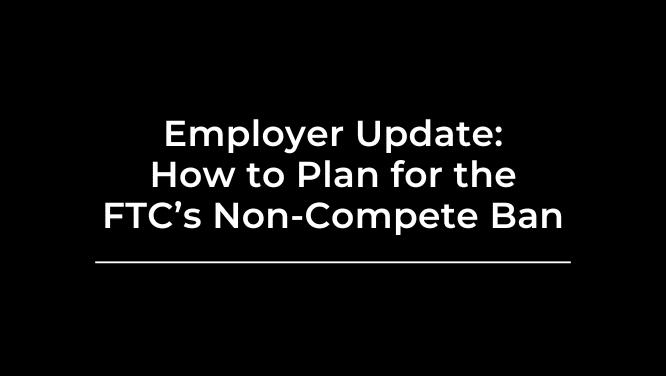Employer Update: How to Plan for the FTC’s Non-Compete Ban

- KO Firm
- |
- May 7, 2024
In an effort to promote competition, protect workers’ rights, and foster innovation and new business formation, the Federal Trade Commission recently announced a significant rule aiming to ban non-competes between almost all employers and employees nationwide.
If this regulation withstands existing and forthcoming legal scrutiny, employers won’t be able to implement most new non-competes, and enforcing existing non-competes will be restricted to a small group, primarily senior executives and those pertaining to the sale of a business.
Additionally, employers will be required to inform current and former workers that their non-competes are no longer enforceable. “Worker” is broadly defined to include, among other persons, employees and individuals classified as independent contractors.
Key Impacts of the Non-Compete Rule
- Employers will no longer be able to enter into new non-compete clauses with workers
- Employers will no longer be able to enforce existing non-compete agreements with workers
- Employers must provide notice to current and former workers that their non-competes are no longer enforceable
The rule defines a “non-competition agreement” as any written or verbal term, condition, or policy that prevents or penalizes a worker from seeking or accepting employment elsewhere or starting a business.
The rule indicates that existing agreements with “senior executives,” defined as those earning more than $151,164 total annual compensation annually who are in “policy-making positions,” can still be upheld.
Other forms of employer protections, like customer non-solicitation agreements, employee non-recruitment, confidentiality, and non-disclosure provisions, remain valid as long as they don’t impede job opportunities. Note, however, that state laws will still apply to the extent that they do not conflict with the rule, and may limit the availability of such alternatives.
Employers should also note that the final rule allows for non-competes associated with the sale of a business or sale of an individual’s ownership interest.
Next Steps for Employers
Prior to the date the rule takes effect, businesses will be required to provide notice to current and former workers subject to active non-compete clauses that their non-compete clause is no longer in effect and is unenforceable. Existing non-competes with senior executives, as discussed above, may remain in force.
While the rule isn’t set to take effect until September 2024, at the earliest, employers should begin to:
- Take inventory of all new and existing non-compete agreements; and
- Strategize with your leadership team and legal counsel on alternatives, such as customer non-solicitations or confidentiality provisions, to protect your business interests, intellectual property, and trade secrets.
Preparation is key amidst regulatory changes. By understanding the rule and taking proactive steps, employers can navigate potential challenges and protect your business interests effectively.
For questions on the rule and counsel on how to best update your policies and how to draft and deliver required notices, please reach out to Niki Schwab or Brad Schoenfeld.




